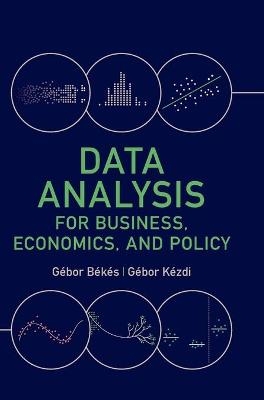
Data Analysis for Business, Economics, and Policy
Cambridge University Press (Verlag)
978-1-108-48301-8 (ISBN)
This textbook provides future data analysts with the tools, methods, and skills needed to answer data-focused, real-life questions; to carry out data analysis; and to visualize and interpret results to support better decisions in business, economics, and public policy. Data wrangling and exploration, regression analysis, machine learning, and causal analysis are comprehensively covered, as well as when, why, and how the methods work, and how they relate to each other. As the most effective way to communicate data analysis, running case studies play a central role in this textbook. Each case starts with an industry-relevant question and answers it by using real-world data and applying the tools and methods covered in the textbook. Learning is then consolidated by 360 practice questions and 120 data exercises. Extensive online resources, including raw and cleaned data and codes for all analysis in Stata, R, and Python, can be found at www.gabors-data-analysis.com.
Gábor Békés is an assistant professor at the Department of Economics and Business of the Central European University, and Director of the Business Analytics Program. He is a senior fellow at KRTK and a research affiliate at the Center for Economic Policy Research (CEPR). He has published in top economics journals on multinational firm activities and productivity, business clusters, and innovation spillovers. He has managed international data collection projects on firm performance and supply chains. He has done policy advising (the European Commission, ECB) as well as private-sector consultancy (in finance, business intelligence, and real estate). He has taught graduate-level data analysis and economic geography courses since 2012. Gábor Kézdi is a research associate professor at the University of Michigan's Institute for Social Research. He has published in top journals in economics, statistics, and political science on topics including household finances, health, education, demography, and ethnic disadvantages and prejudice. He has managed several data collection projects in Europe; currently, he is co-investigator of the Health and Retirement Study in the US. He has consulted for various governmental and non-governmental institutions on the disadvantage of the Roma minority and the evaluation of social interventions. He has taught data analysis, econometrics, and labor economics from undergraduate to Ph.D. levels since 2002, and supervised a number of MA and Ph.D. students.
Part I. Data Exploration: 1. Origins of data; 2. Preparing data for analysis; 3. Exploratory data analysis; 4. Comparison and correlation; 5. Generalizing from data; 6. Testing hypotheses; Part II. Regression Analysis: 7. Simple regression; 8. Complicated patterns and messy data; 9. Generalizing results of a regression; 10. Multiple linear regression; 11. Modeling probabilities; 12. Regression with time series data; Part III. Prediction: 13. A framework for prediction; 14. Model building for prediction; 15. Regression trees; 16. Random forest and boosting; 17. Probability prediction and classification; 18. Forecasting from time series data; Part IV. Causal Analysis: 19. A framework for causal analysis; 20. Designing and analyzing experiments; 21. Regression and matching with observational data; 22. Difference-in-differences; 23. Methods for panel data; 24. Appropriate control groups for panel data; Bibliography; Index.
| Erscheinungsdatum | 06.05.2021 |
|---|---|
| Zusatzinfo | Worked examples or Exercises |
| Verlagsort | Cambridge |
| Sprache | englisch |
| Maße | 197 x 252 mm |
| Gewicht | 1760 g |
| Themenwelt | Wirtschaft ► Betriebswirtschaft / Management ► Finanzierung |
| Wirtschaft ► Volkswirtschaftslehre ► Ökonometrie | |
| ISBN-10 | 1-108-48301-1 / 1108483011 |
| ISBN-13 | 978-1-108-48301-8 / 9781108483018 |
| Zustand | Neuware |
| Informationen gemäß Produktsicherheitsverordnung (GPSR) | |
| Haben Sie eine Frage zum Produkt? |
aus dem Bereich


